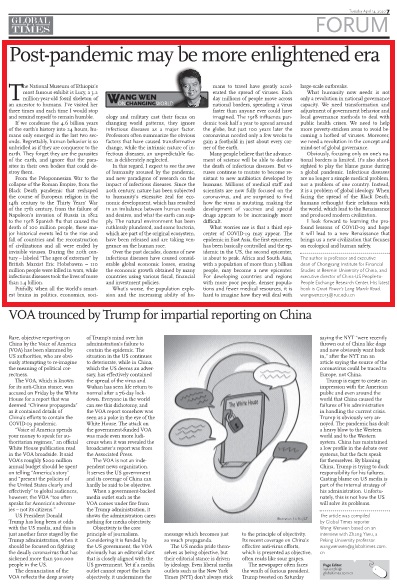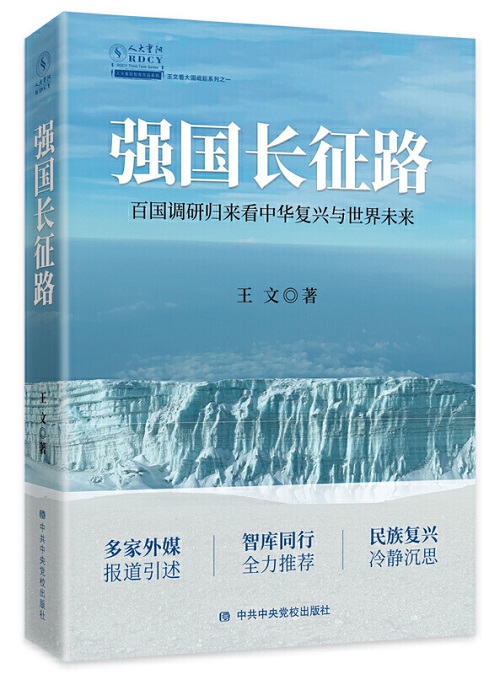Commentaries
Your Present Location: Teacher_Home> Wang Wen> CommentariesWang Wen: Post-pandemic may be more enlightened era
By: Wang Wen Source: Global Times Published: 2020-04-13

The National Museum of Ethiopia's most famous exhibit is Lucy, a 3.2 million-year-old fossil skeleton of an ancestor to humans. I've visited her three times and each time I would stop and remind myself to remain humble.
If we condense the 4.6 billion years of the earth's history into 24 hours, humans only emerged in the last two seconds. Regrettably, human behavior is so unbridled as if they are conqueror to the earth. They forget they are the parasites of the earth, and ignore that the parasites in their own bodies that could destroy them.
From the Peloponnesian War to the collapse of the Roman Empire, from the Black Death pandemic that reshaped the course of European religion in the 14th century to the Thirty Years' War of the 17th century, from the failure of Napoleon's invasion of Russia in 1812 to the 1918 Spanish flu that caused the death of 100 million people, these major historical events led to the rise and fall of countries and the reconstruction of civilizations and all were ended by invisible viruses. During the 20th century - labeled "The ages of extremes" by British Marxist Eric Hobsbawm - 110 million people were killed in wars, while infectious diseases took the lives of more than 1.4 billion.
Pitifully, when all the world's smartest brains in politics, economics, sociology and military cast their focus on changing world patterns, they ignore infectious diseases as a major factor. Professors often summarize the obvious factors that have caused transformative change, while the intrinsic nature of infectious diseases, an unpredictable factor, is deliberately neglected.
In this regard, I expect to see the awe of humanity aroused by the pandemic, and new paradigms of research on the impact of infectious diseases. Since the 20th century, nature has been subjected to humanity's excessive zeal for economic development, which has resulted in an imbalance between human needs and desires, and what the earth can supply. The natural environment has been ruthlessly plundered, and some bacteria, which are part of the original ecosystem, have been released and are taking vengeance on the human race.
Over the past decades, dozens of new infectious diseases have caused considerable global economic losses, erasing the economic growth obtained by many countries using various fiscal, financial and investment policies.
What's worse, the population explosion and the increasing ability of humans to travel have greatly accelerated the spread of viruses. Each day millions of people move across national borders, spreading a virus faster than anyone ever could have imagined. The 1918 influenza pandemic took half a year to spread around the globe, but just 100 years later the coronavirus needed only a few weeks to gain a foothold in just about every corner of the earth.

Many people believe that the advancement of science will be able to declare the death of infectious diseases. But viruses continue to mutate to become resistant to new antibiotics developed by humans. Millions of medical staff and scientists are now fully focused on the coronavirus, and are surprised to find how the virus is mutating, making the development of vaccines and special drugs appears to be increasingly more difficult.
What worries me is that a third epicenter of COVID-19 may appear. The epidemic in East Asia, the first epicenter, has been basically controlled and the epidemic in the US, the second epicenter, is about to peak. Africa and South Asia, with a population of more than 3 billion people, may become a new epicenter. For developing countries and regions with more poor people, denser populations and fewer medical resources, it is hard to imagine how they will deal with large-scale outbreaks.
What humanity now needs is not only a revolution in national governance capacity. We need transformation and adjustment of government behavior and local governance methods to deal with public health crises. We need to help more poverty-stricken areas to avoid becoming a hotbed of viruses. Moreover, we need a revolution in the concept and mind-set of global governance.
Obviously, focusing only on one's national borders is limited. It's also shortsighted to play the blame game during a global pandemic. Infectious diseases are no longer a simple medical problem, nor a problem of one country. Instead, it is a problem of global ideology. When facing the spread of the Black Death, humans rethought their relations with the world, which lead to the Renaissance and produced modern civilization.
I look forward to learning the profound lessons of COVID-19 and hope it will lead to a new Renaissance that brings us a new civilization that focuses on ecological and human safety.
The author is professor and executive dean of Chongyang Institute for Financial Studies at Renmin University of China, and executive director of China-US People-to-People Exchange Research Center. His latest book is Great Power's Long March Road.

Key Words: Covid-19 Epidemic; humanity; Wang Wen; RDCY























































































 京公网安备 11010802037854号
京公网安备 11010802037854号





